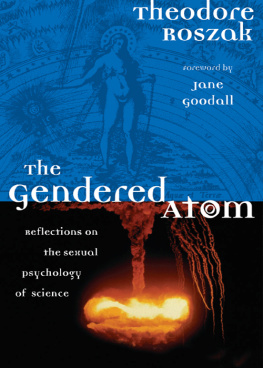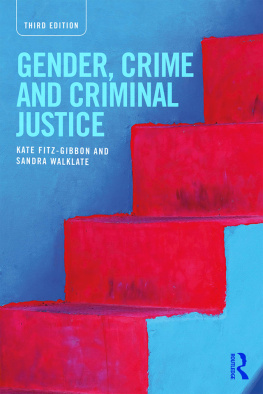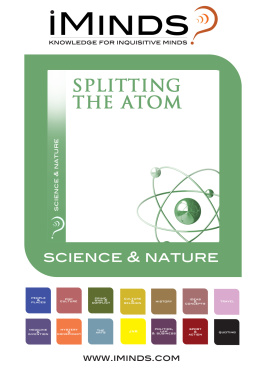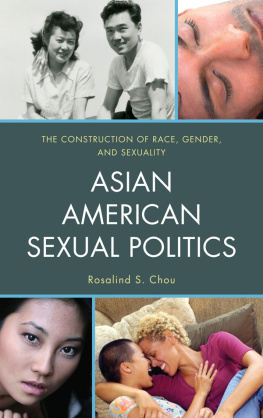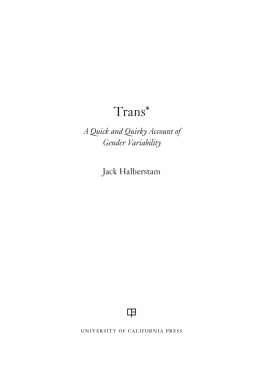SCIENCE/CURRENT EVENTS
W ith daring originality, Theodore Roszak explores the uncharted depths of the scientific soul. There, beneath the scientist's rational, purportedly objective surface, Roszak finds a maelstrom of repressed sexual biases and gender stereotypes. Far from a purely objective view of the natural world, sciencedown to the very conception of the atomis suffused with sexual politics. And the result, sadly, is a culture at risk from global warming, nuclear proliferation, toxic waste, genetic engineering, and more.
Male scientists, Roszak observes, have always been more male than scientist. So modern scientists, from the age of Galileo and Newton, have subjected natureMother Earthto a typically masculine drive to control and exploit. Deftly drawing on insights from Mary Shelley's Frankensteinthe classic tale of science gone madand from the new field of feminist psychology, the author shows how centuries of male domination have distorted not only scientific research and development, but also our relationship to one another and to the natural world.
The fallout from gender stereotypes, however, is not a problem that can be solved merely by recruiting more women into the sciences. In Roszak's view, It is not just individual scientists who account for gender bias in science, but the official psychology of the field as a whole. As long as a good scientist is expected to treat nature as something outside, alien, and detached from our feelings and responsibilities, as long as scientists think nature is ours to use as we see fit, science will be shot through with masculine characteristics.
The Gendered Atom envisions a new, gender-free science that lies beyond sexual politics, respects our community with nature, and promises a healthier, more sustainable relationship between ourselves and the world we inhabit.

THEODORE ROSZAK is Professor of History at California State University, Hayward. He is the author of several bestselling books, including The Making of a Counterculture, The Voice of the Earth, and a prize-winning novel, The Memoirs of Elizabeth Frankenstein. A Guggenheim Fellowship recipient, he has twice been nominated for the National Book Award and twice earned Goldman Environmental Foundation grants.
Jacket design by Claudia Smelser
Additional praise for The Gendered Atom
An ambitious, lively, learned, and highly readable riffon Frankenstein that ranges from Romantic theory to postmodern physics in its quest to investigate the (en)gendering of what Mary Shelley's mad scientist calls his hideous progeny.Sandra M. Gilbert, Professor of English, University of California at Davis, author of No Man's Land: The Place of the Woman Writer in the Twentieth Century and coauthor of Mad Woman in the Attic: The Woman Writer and the Nineteenth Century Literary Imagination
In a voice both personal and scholarly, witty and literate, Theodore Roszak adds his analysis to the feminist critique of masculinist science. This work traces atomistic thought in science through the multiple perspectives of history, literature, and feminist psychology. Roszak demonstrates quite convincinglythrough the use of the Frankenstein myth, the life events of Mary Shelley, and a careful application of feminist psychologythat the concept of the minute atom carries all the cultural weight of the gendered vision that has come close to destroying nature itself. Roszak joins forces, in this work, with those who have successfully uncloaked the objective garb of modern science to expose the masculine body of knowledge beneath it. The Gendered Atom adds significantly to a distinguished career of fine scholarship and passionate social criticism.Ellyn Kaschak, Professor of Psychology, San Jose State University, author of Engendered Lives: A New Psychology of Women's Experience; coeditor, Women and Therapy
A provocative and well-written view of problems in science and the psychology of gender. Evelyn Fox Keller, Professor of the History and Philosophy of Science, Massachusetts Institute of Technology, author of Reflections on Gender and Science

Copyright 1999 by Theodore Roszak
All rights reserved. No part of this book may be used or reproduced in any manner whatsoever without written permission, except in the case of brief quotations in critical articles or reviews. For information, contact: Conari Press, 2550 Ninth Street, Suite 101, Berkeley, California 94710-2551.
Conari Press books are distributed by Publishers Group West.
Jacket and book design: Claudia Smelser
Cover photograph: Courtesy of Photodisc
Library of Congress Cataloging-in-Publication Data
Roszak, Theodore
The gendered atom : reflections on the sexual psychology of science / Theodore Roszak : foreword by Jane Goodall.
p. cm.
Includes bibliographical references.
ISBN : 1-57324-171-7 (hardcover)
1. Science and psychology. 2. PsychologyPhilosophy. 3. Sex (Psychology) 4. Feminist psychology. I. Title.
BF 64.R69 1999
9916074
501dc21
CIP
Printed in the United States of America on recycled paper.
99 00 01 02 DATA 10 9 8 7 6 5 4 3 2 1
For Betty,
With Betty
Table of Contents
Foreword by Jane Goodall
The Gendered Atom is a challenging book. And it is an important book, in that it poses questions and raises issues that Western scientists seldom consider and with which they are ill equipped to deal. Scientists, striving to understand the world in which we live, are taught to value objectivity above all. Yet, as Theodore Roszak points out, we cannot remove ourselves from the equation. However much we, as scientists, may try to be impersonal objective observers, we cannot escape our individuality; we bring our own values and ideas to our work. These ideas reflect our culture, our family backgrounds, the times in which we live, and, as Roszak believes, our gender. Only when we admit to this will we realize the extent to which we may unintentionally bias our interpretations of our observations, or the very nature of the questions we ask.
Western science, until recently the domain of men, has long held an overly simplistic, mechanistic view of our world. For example, scientists have typically asserted that animals are little more than machines, incapable of feeling pain or any humanlike emotions. However complex a behavioral interaction seemed to be, the most parsimonious, the simplest explanation was considered the most scientificand therefore the best. More recently, the field of sociobiology has contributed to scientific reductionism. These attitudes, compounded by increasing urbanization along with our selfish, materialistic lifestyles, have led to a gradual alienation from the natural world. We have cut ourselves off from our roots. Whereas indigenous people see themselves as part of nature and live in harmony with a world in which other animals are their brothers and sisters, many scientists (and other people) today believe that we are part of a great unfeeling machine in which animals are considered lower and inferior forms of life.
In its effort to understand this unfeeling and sometimes hostile world, science has frequently attempted to subdue and dominate it. Psychologically, this aggressive approach has served to reinforce, in mainstream scientific methodology, the stereotyped male traits of toughness and competition. And this, Roszak suggests, has resulted in a clear-cut gender bias. At its most obvious, this gender bias, until very recently, led to the almost total exclusion of women from the scientific professionseven after our society at large had long since emerged from the prefeminist era. At a more subtle level, gender bias created what Roszak calls macho science, a scientific methodology from which qualities regarded as femininesensitivity, gentleness, warmth, compassion, and intuitionwere excluded.
Next page
